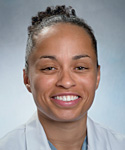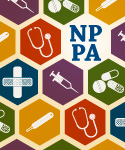November 4th, 2015
What Should “PA” Stand For?
Bianca Belcher, MPH, PA-C
In the past few years, the charge to rename our profession from “physician assistant” to “physician associate” has gained momentum. Although a name change would not alter the scope of what PAs do on a day-to-day basis, the argument is that it might better inform our patients’ and colleagues’ perceptions of what we do. Groups for and against the idea sit adamantly on their respective sides. At this time, some accredited PA programs — e.g., the Yale School of Medicine and the University of Oklahoma School of Medicine — have already renamed their programs using the new physician associate title.
If you are a practicing PA with an unformulated opinion on this issue or a prospective applicant to PA school, you may want to be aware of the basic arguments on each side. Here they are:
 Arguments for keeping the name “physician assistant”:
Arguments for keeping the name “physician assistant”:
- Regardless of what “PA” stands for, patients will still need to be educated on what a PA does. Whether a patient is asking, “What is a physician assistant?” or “What is a physician associate?” the answer is the same. A name change will not replace patient and colleague education.
- The field has grown quickly with the current name, and changing it now could lead to confusion.
- Changing the name is costly. First, it takes financial and volunteer resources to lobby legislators to change current legislation. These are resources that could be used to further the PA profession in other tangible ways, such as eliminating practice barriers. Secondly, PA programs and other supporting organizations will need to purchase all new materials with new branding.
- Medical literature database searches would become more complicated, e.g., requiring use of both “physician assistant” and “physician associate” as keywords.
- Every state would have to reopen all legislation containing the term “physician assistant” to revise it to “physician associate.” This process could inadvertently lead to reduction of practice privileges established in those bills that PAs have worked so hard to gain.
Arguments for changing the name to “physician associate”:
- The term “assistant” is a misnomer and downplays the role of the PA in patient care. PAs work as an integral part of the medical team.
- Patients confuse physician assistants with medical assistants.
- “Assistant” denotes a technical job, not a professional one.
- The role of a PA has evolved since the profession’s inception, and the name should reflect that evolution.
- As the PA profession is expanding internationally, it is important to develop a name that better encompasses our role and is understood beyond our borders.
- PAs are held to the same medical and legal standards as physicians, yet the term “assistant” suggests a lesser standard.
Despite the current debate over what the “A” in PA should signify, I think we universally agree that the use of the possessive apostrophe ‘s’ after physician (physician’s assistant/associate) makes us cringe. Regardless of our name, PAs will undoubtedly continue to focus on practicing high-quality, team-based medicine and educating their patients about who they are and what they do.
Which side of the debate do you fall on?



First, a correction. Yale has not renamed its PA Program, it has always been called the Physician Associate Program.
Second, this is an old tired argument. I was trained as a Physician Associate and have been called a physician assistant since I began my professional career over 36 years I have always shied away from this discussion because it wastes energy, time and money. I have always felt that I am a PA. I have let any patient or professional opinions of me rely on my demonstrated skills and ability to communicate with and care for patients. I would love to see this discussion simply go away.
Tony,
Thanks for the comments. I think you bring up a sentiment that perhaps delineates a 3rd, but prevalent opinion base – those that are sick of or indifferent to the argument all together. Your thoughts are much appreciated. Thanks for sharing.
Best,
Bianca
PAs stand for excellence in clinical care practiced safely in teams with other healthcare professionals.
PAs stand for increasing access to all levels of the health care system.
PAs stand for patients.
Keep up the good work Bianca.
Thanks for the comment David! I appreciate the feedback from a well-seasoned blogger!
I think a name change is overdue. I have been a practicing PA for over 24 years and have seen the profession evolve from an “assistant” to a true “associate” profession. I realize it would be complicated and expensive to change our name, but neither one should be an excuse to do nothing. All change is messy, but it is necessary for growth.
The Yale and OU programs have always been Physician Associate programs, they have not “recently changed”.
Debra and Tony,
Thanks for the correction regarding the programs. You are absolutely right. I’ll revise that.
Best,
Bianca
I practiced for 41 years as a RPA-C and a FNP-C. Using whatever licenses wwas better based on what my Docs needed.
There was never any difference in what I could do or did.
This is the same discussion that was present when I started.
I agree with Tony. Much to do about nothing. PA name is well known and respected. It will be a nightmare to change.
Guess how many different groups of providers will try to limit what we do in our present work environments.
Leave the name alone.
I feel that a name change is in our best interest. We are highly trained Medical Professionals with Prescriptive authority. We exist to allow more patients access to quality Medical care – TO ME that makes me a Physician Associate
The term physician’s assistant originated in a 1960 address by Charles Hudson to the House of Delegates of the AMA. It was later published in the JAMA. The educational experiment at Duke University to train physician’s assistants proved so popular that scores of programs arose across the country. They varied in length from 4 weeks to 4 years. By 1969, there were more than 200 programs purporting to train assistants to physicians. Confession reigned.The BOM of the NAS proposed a classification to sort out the differences between the programs. Type “A” assistants were substantially trained in depth and breadth in diagnosis and therapy, sufficiently capable of integrating findings with medical knowledge to be able to exercise a degree of independent judgement. Type “B” assistants were intensively trained in a narrow clinical area to develop special skills, enabling the assistant to perform within a degree of competence not possessed by physicians who were not involved with that specialty. Type “C” assistants were trained to perform a variety of tasks over a wide spectrum of clinical care, without the medical knowledge that would enable independent judgement.
In 1970 at the third Duke conference Robert Howard, director of the Duke PA program, together with colleagues from Bowman Gray and the U. of Texas, Galveston, formed the American Registry of Physician’s Associates to provide a mechanism for identifying trained physician assistants. The term associate was used in order to differentiate the Type A from the other categories. At the same time, Duke changed the name of their program to Physician Associate Program. Six other program followed suit.
In April 1971, AAPA leaders produced the first issue of a new journal, the Physician’s Associate Journal, and began calling themselves the American Association of Physicians’ Associates. AAPA membership meeting in June 1971 amended the article and bylaws. AAPA was now incorporated as the American Academy of Physicians’ Associates. Membership was restricted to Type A program graduates.
The blowback from the medical profession was rapid and explicit, AMA objected to the name as did other medical specialty societies.
From then on the political jockeying between the groups, AMA, National Board of Medical Examiners and the accreditation process for PA programs, and certification of PAs was underway. The term Physician Associate fell on deaf ears and eventually was forced out of existence by the AMA, etc. By February 1973 the AAPA amended it founding documents to be the American Academy of Physician’s Assistants.
It is unfortunate that the AAPA was unable to see the future restrictions that would occur to PAs simply because of a name. Now, PAs, state by state work diligently to amend our laws to reflect what we do, and that is not as an “assistant” to a physician. The belief that it would be too expensive to modernize our title back to the future is unfounded, and I believe, not actually studied to the actual cost. There is a way to modernize w/o undue burden to states by simply amending state laws to say the a PA is allowed to call themselves a Physician Assistant or Physician Associate, or PA, whatever they desire as long as they meet the requirements for education and certification.
For reference: PA Profesisonal January 2012 for full article, which is greatly compressed by me.
Paula,
Thank you for the excellent synopsis of the name history!
Best,
Bianca
That should be confusion….not confession!
I got into the profession (as did many of my colleagues) with no illusions about what our title would be upon attaining the requisite education and certification. I think that the title of “Physician Assistant,” while unfortunately connoting an image of subservience to some, does not detract from our roles as excellent medical practitioners as part of a team. I feel strongly that the money and resources necessary for a name change could be better spent on promoting the PA profession, and educating others about the profession. Given the tireless efforts of the AAPA and others in attaining recent legislative victories for PAs also, I do not feel it is worth having to re-legislate all laws with “Physician Assistant” in them. (Which as you mention would be a necessity if the profession were to change its title.) I think the profession would be wiser to focus on the preservation of its excellent trajectory and reputation in the coming years than to invest in a potentially ugly battle to change its name. And yes, the apostrophe does make me cringe.
Excellent, concise and eloquent. Thank you for your voice of reason.